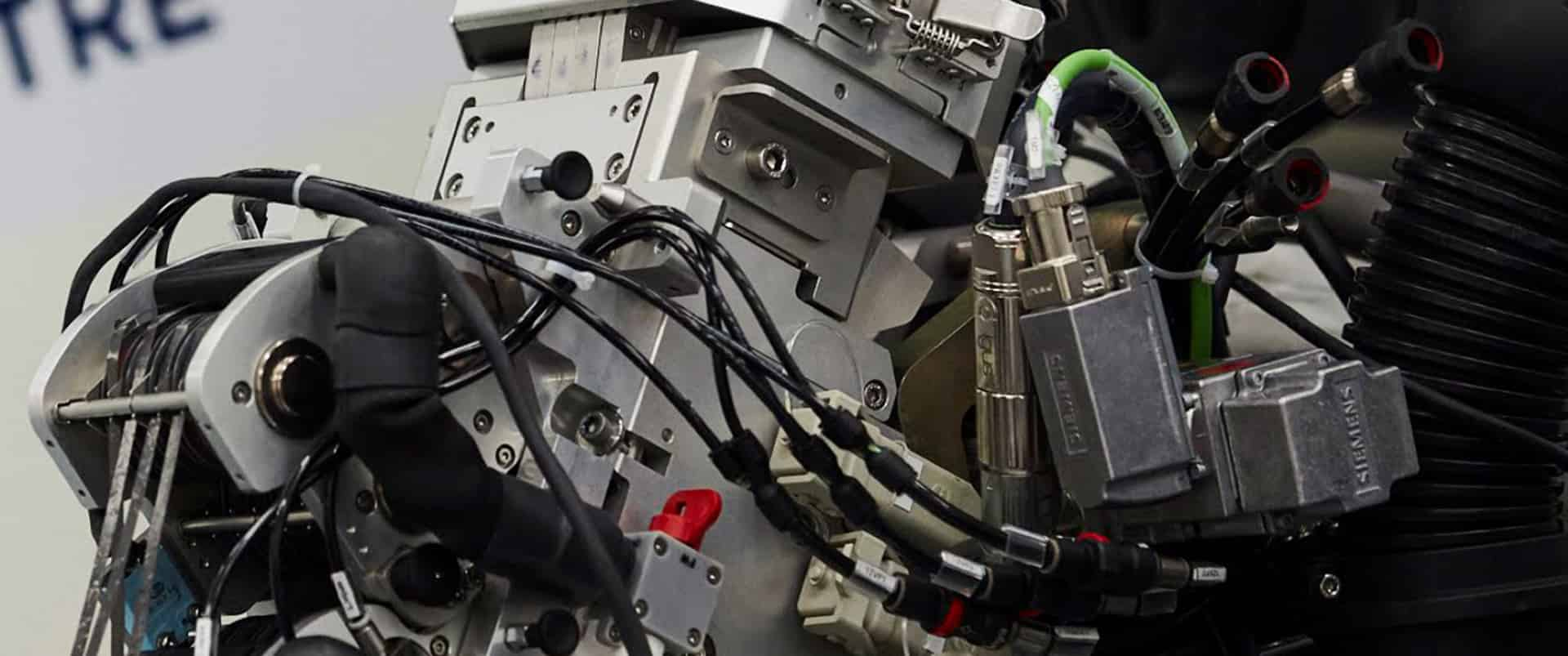30 October 2014
30 October 2014
An innovative racing yacht, lightweight road cars and the largest openly accessible high rate manufacturing press for composites in Europe were on show to highlight the National Composites Centre (NCC) capabilities. The Rt Hon Dr Vince Cable MP, Secretary of State for the Department of Business, Innovation and Skills (BIS) formally opened the new NCC facilities at the Building the Future for Composites event in Bristol.
Dr Cable was joined by more than 400 guests to see the new facilities at the NCC, funded by £28m investment from BIS, via InnovateUK and the High Value Manufacturing Catapult. The Secretary of State saw demonstrations of cutting-edge manufacturing capability, including the new High Volume Manufacturing Composite Press. In addition, to visiting the innovative SME support facilities, Dr Cable also met the highly skilled engineers and technicians that assist UK manufacturers to research, develop and commercialise new technologies and products. In the NCC’s new training suite he talked to NCC’s graduate trainees on a course developing their composite laminating skills.
Business Secretary Vince Cable said, “The National Composites Centre is leading the way in developing composites, the advanced materials which are crucial to Britain's aerospace and automotive industries amongst others. Britain is historically very good at making scientific discoveries but not turning these ideas into businesses. The NCC is part of the network of Catapult Centres across the country that is helping us to do just that - providing skilled jobs and a stronger economy.”
Peter Chivers, NCC Chief Executive, said, “The NCC is ‘Building the Future for Composites’, we’re proud to be recognised as part of the #BuildingBritain campaign. We will work with companies to accelerate innovation and develop people to deliver commercially viable solutions. Thanks to the BIS capital investment, and HVM Catapult Core funding, we have now installed the world’s largest openly accessible high rate manufacturing press for composites manufacturing. This is aimed at supporting sectors such as Automotive, where developing high rate, low cost manufacture of composite components is critical. This press is only in its first week of factory trials, yet it is already producing parts within just six minutes.”
He continued, “In order to develop and optimise a full factory process, further HVM Catapult Core funds will be utilised for key investments in automated preforming technology and automated part and tool handling. Our innovative small-scale workshop is a real jewel in the crown; the type of equipment here aligns to the needs of the UK SME supply chain. We have already assisted well over 100 SMEs and the new facility and future HVM Catapult investment will substantially enhance this offering.”
He concluded, “Finally, the people aspect. We need to help companies to accelerate innovation alongside people development in order to deliver the commercial solutions required to compete globally. You have heard that this industry is growing rapidly; you only have to look around this building to see the emerging new technologies, so the new NCC training centre, with its adaptable space and hands-on training capability, will help ensure industry will be able to find the people with the right knowledge and skills, in the right numbers.”
The NCC has powerful support from industry. This year alone sees more than £14m of technology development work from industry pass through the centre. After only three years, the NCC has nearly forty Members and has worked with more than one hundred companies. The event included an exhibition from the NCC Members, showing some of the work undertaken in the centre and illustrating what composites technology can do across a wide range of industries.
Colin Sirett, Chair of the NCC’s Steering Board, added, “We are delighted to welcome the Secretary of State to see the enhanced facilities and to highlight all that has been achieved here and all that is yet to come. The NCC is a fantastic national asset and is a catalyst for real change in the industry. The centre has something for all businesses involved in composites manufacture, across all sectors. We already have commitments from large and medium sized enterprises involved in renewable energy, aerospace, automotive, defence, marine and rail, and we expect this list to grow.”
“We are now focussed on working closely with industrial partners, the University of Bristol and other centres of academic excellence, as well as our partner centres from the HVM Catapult, to ensure the UK remains competitive in the expanding global market place and therefore that the UK composites manufacturing industry can contribute significantly to the country’s economy.”
Alison Starr, Chair of Composites Leadership Forum said, “In 2011, the CLF was formed as the voice of ‘composites-using’ industries. This cross-sectorial body draws support from many of the UK’s leading industrial sectors, recognised by the UK Industrial Sector Strategies. Today, the CLF provided an initial brief of the 2014 UK Composites Strategy. This has been developed through extensive review and analysis of the future global composite market, the current UK capability and the actions required to grasp the opportunities. The work has been undertaken in consultation with industry, academia and government. The strategy identifies three types of support needed to sustain and grow the UK composites industry: ‘Protect’ and accelerate growth in established sectors; ‘Progress’ and develop technology and supply chains for mid to high volume manufacturing; and finally ‘Position’ the industry to enable emerging sectors to make a paradigm shift to capture the opportunity.”
Iain Gray, Chief Executive of Innovate UK, said, "This outstanding new extension to the National Composites Centre is a great example of how Catapults are providing access to world-class research and development facilities and expert staff that would otherwise be out of reach for many businesses in the UK.”
He continued, "It also vividly illustrates the rapid progress that is being seen across the seven High Value Manufacturing centres and the whole Catapult network, helping to fundamentally change the ability of the UK to drive economic growth through innovation."
Professor Nishan Canagarajah, Pro Vice-Chancellor for Research at the University of Bristol, said, "The NCC is enabling multiple collaborations between industry and higher education partners, both nationally and internationally. Commercialisation of emerging technologies is a significant area of focus for our economy and the activities that take place here are an exemplar of that in action: world-class research combined with the entrepreneurial spirit of investigation and practical application.”


